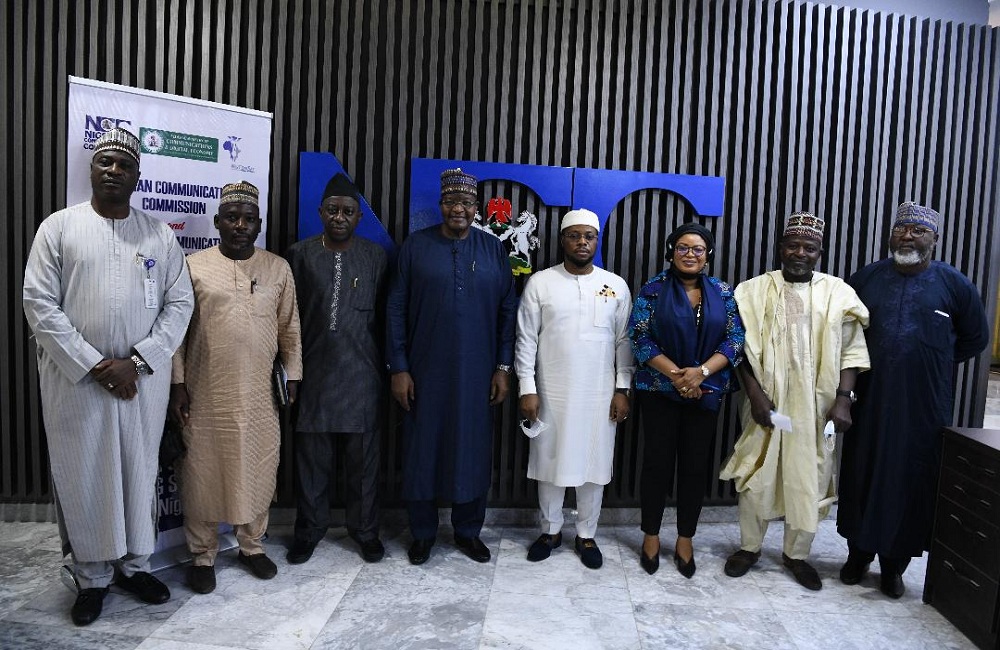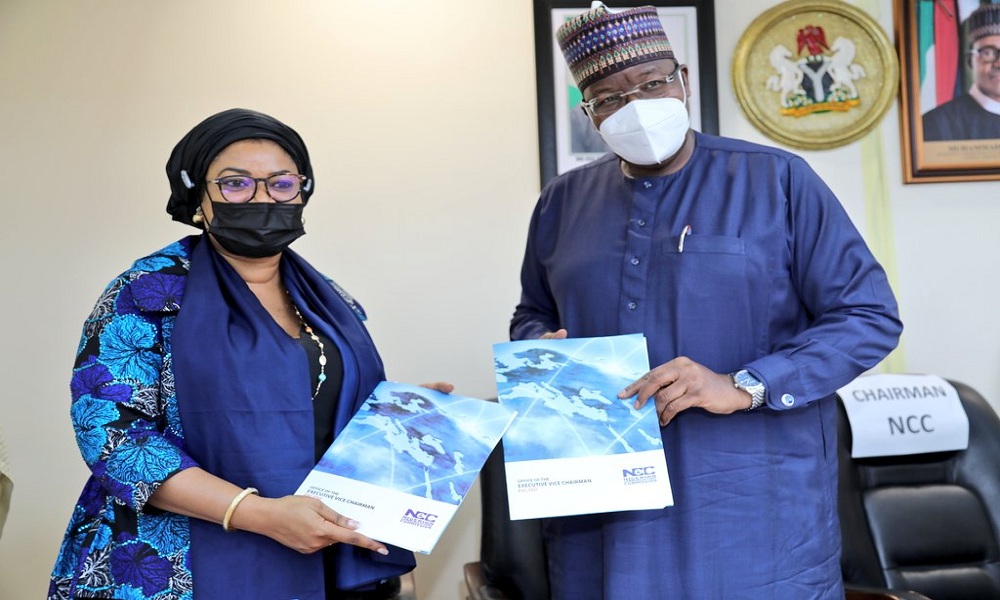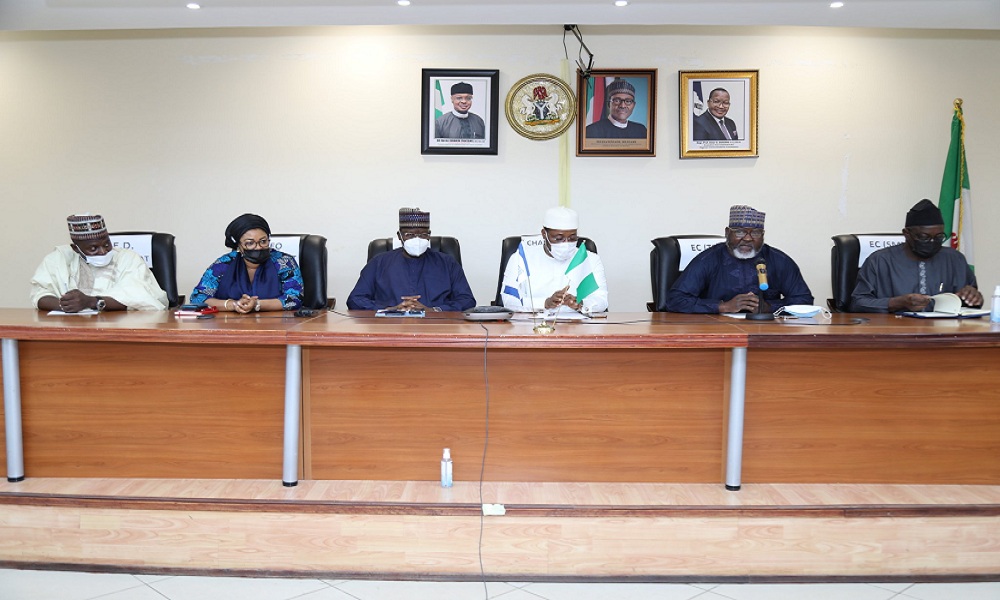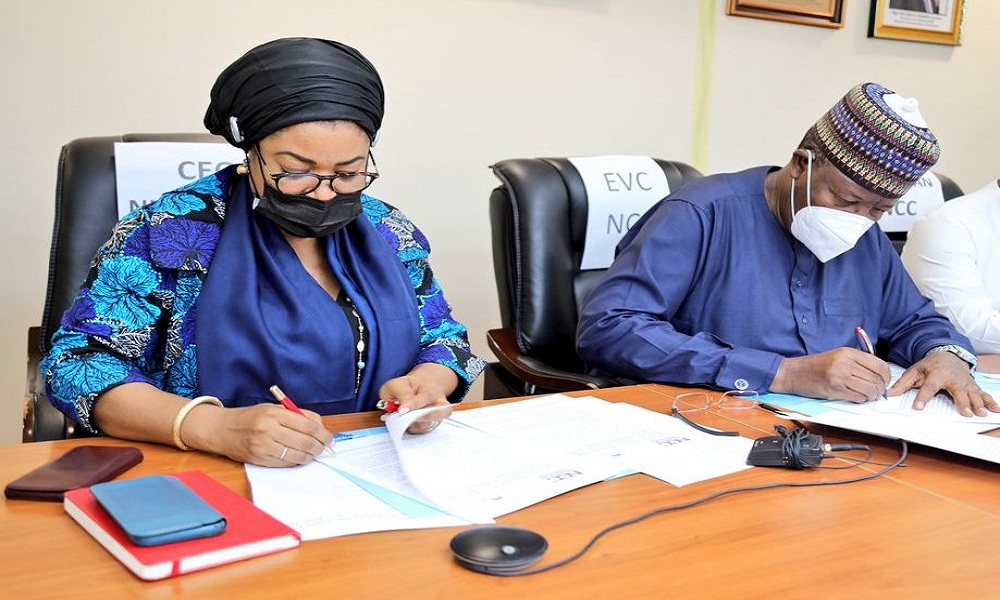The Nigerian Communications Satellite (NigComSat) and the Nigerian Communications Commission (NCC) Wednesday signed a Memorandum of Understanding (MoU) that will facilitate the release of contiguous bandwidth in one of the most suitable Frequency Spectrum bands for early deployment of 5G (Fifth Generation) Network services in Nigeria.
Speaking at the historic event, Executive Vice Chairman of the Nigerian Communications Commission (NCC), Prof. Umar Garba Danbatta said amongst the Frequency Spectrum bands allocated to 5G by the International Telecommunications Union (ITU, the C-band (3.4GHz-3.9GHz) stands out because of its balancing point between coverage and capacity which provides the perfect environment for 5G connectivity.
“The C-band is most suitable and appropriate for immediate deployment of 5G services taking into consideration availability of device ecosystem with 60-70% of global commercial 5G network deployment currently in the band, thus the importance of this Spectrum for early deployment of 5G services in Nigeria cannot be overemphasized.
“For optimal 5G service performance, an average of contiguous 100 MHz of spectrum in the C-band is required by an Operator. However in Nigeria, only 120 MHz of the band (3.4–3.52) GHz is available for mobile services while the remaining 680 MHz (3.52–4.2) GHz of the band is used by NigComSat (NG-1R) satellites,” Danbatta said.

The EVC disclosed that the NCC initiated a negotiation with NIGCOMSAT whom in its (NCC) estimate could make some adjustment to its satellite operation and release part of its Spectrum holding in the band to facilitate the deployment of 5G in Nigeria, adding that the impeccable team at NigComSat proved the Commission right.
“The two agencies have been in discussions on how to relocate the operations of NG-1R to the standard C-band 300MHz (3.9GHz– 4.2GHz) portion of the band, which is more suitable in terms of Satellite service offering because end-user terminals are cheaper there while leaving the non-standard C-band 400MHz (3.5GHz–3.9GHz) portion of the band for 5G use,” he said.
Danbatta further stated that the cost of relocating the NG-1R is expected to be offset from the proceeds of the auction of the 5G Spectrum, noting that both the NigComSat and the NCC have developed a Memorandum of Understanding (MOU) detailing all the aspects of this undertaking.
The EVC of the NCC the Management of the NigComSat under the leadership of Dr. Abimbola Alale for demonstrating that the interest of the country is paramount to the agencies’ organizational or personal interest.

Danbatta hoped that the impact of this decision knows no bounds and will not only strengthen the relationship between both agencies but would also go a long way in making a positive impact on the Nigerian economy.
Earlier in his speech, the Chairman of the Board of Commissioners of the NCC, Prof. Adeolu Akande recalled that in recent times, several administrations have begun to license Spectrum for commercial deployment of 5G, noting that as it stands today, 5G services have already been deployed in the United States of America, South Korea, United Kingdom, China, South Africa, Kenya and many more.
“Telecommunication evolution from inception to date has led to improvement in user experience witnessed from 2G, 3G and later 4G. The global impact of 4G brought about increases in mobile usage and network performance. 5G will build on this momentum, bringing substantial network improvements, including higher connection speeds, mobility and capacity, as well as low-latency capabilities.
“In doing so, it enables new use cases and applications that will positively impact different sectors and improve efforts towards achieving Digital Economies. It does not only offer enhanced broadband and ultra-low, ultra-reliable latency communications but also provides massive machine-type communications, where a lot of devices will seamlessly connect and independently interact with the internet without human intervention,” he said.
Prof. Akande stated that Spectrum plays a critical role in realising the full extent of these new capabilities, adding that 5G’s full socio-economic impact is dependent on access to a variety of spectrum resources.
“These Spectrums will play a key role in meeting the demand for many enhanced mobile data services as well as new wireless broadband use cases such as remote object manipulation, industrial automation, virtual and augmented reality and next-generation connectivity for vehicles. These use cases will continue to increase the impact that mobile services have on societies and economies.
“In China, UAE, Europe, Africa, India, Brazil and Australia, the 3.5GHz band glaringly featured amongst the spectrum that has been prioritized for 5G with prospects for early deployment.”
Akande expressed delight that the Management of NigComSat and NCC has taken a bold step in the right direction to release contagious quantum of Spectrum in the 3.5GHz band for early deployment of 5G, noting that this type of collaboration seeks to ensure synergy amongst agencies under the Federal Ministry of Communication and Digital Economy.
He commended the efforts of the Executive Vice Chairman of the NCC Prof. Umar Garba Danbatta and his counterpart at NigComSat, Dr. Abimbola Alale for making an informed decision in the national interest which will consequently foster the deployment of 5G and enable Nigeria to tap its full potential.
Managing Director of NigComSat, Dr. Abimbola Alale thanked the NCC for collaborating with her company in order to advance the course of the digital economy of the Federal Government.

